|
|
|
Sort Order |
|
|
|
Items / Page
|
|
|
|
|
|
|
| Srl | Item |
| 1 |
ID:
079924
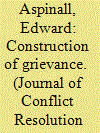

|
|
|
|
|
| Publication |
2007.
|
| Summary/Abstract |
This article makes a case for extending social constructivist approaches to the study of grievance in natural resource conflicts. It does this by analyzing the separatist conflict in Aceh, Indonesia, which is often portrayed as a paradigmatic resource conflict due to the importance of the natural gas industry there. It is argued here, however, that natural resource exploitation promoted conflict in Aceh only because it became entangled in wider processes of identity construction and was reinterpreted back to the population by ethnic political entrepreneurs in a way that legitimated violence. Rather than any intrinsic qualities of natural resource extraction, the key factor was the presence of an appropriate identity-based collective action frame. The argument is strengthened by comparison with two other resource-rich Indonesian provinces where resource extraction patterns were similar to Aceh but where no protracted violence occurred because similar identity resources were not available to local actors
|
|
|
|
|
|
|
|
|
|
|
|
|
|
|
|
| 2 |
ID:
180670
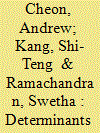

|
|
|
|
|
| Summary/Abstract |
When do indigenous and other negatively affected populations mobilize against fossil fuel companies? We revisit social movement theory and environmental literature to identify three factors that may plausibly shape mobilization decisions of negatively affected populations—democratic institutions, community perceptions of government shaped by land tenure security, and firm attributes. Democratic institutions afford more opportunities for affected populations to air their grievances through protests than non-democratic ones. Land tenure security guaranteed by government contributes to the perception among affected populations that their objectives are better achieved through government mediation than protests. Characteristics of fossil fuel firms, such as state ownership, also shape activist perceptions of government credibility as a mediator. By analyzing fifty-seven countries over the period 1990 to 2013, we find that democracy and state ownership of fossil fuel firms are positively associated with protests, whereas land tenure security is negatively associated.
|
|
|
|
|
|
|
|
|
|
|
|
|
|
|
|
| 3 |
ID:
173767
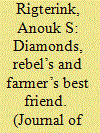

|
|
|
|
|
| Summary/Abstract |
This article investigates the impact of the world price of a “lootable,” labor-intensive natural resource on intensity of violent conflict. Results suggest that a price increase can have opposite effects at different geographical levels of analysis: a decrease in conflict intensity overall in resource-rich countries, but an increase in conflict intensity in resource-rich subnational regions. The article argues that intensity of violence decreases overall due to rising opportunity costs of rebellion but that violence concentrates in resource-rich areas as returns to looting rise. The article introduces a new measure of diamond propensity based on geological characteristics, which is arguably exogenous to conflict and can capture small-scale labor-intensive production better than existing measures. The stated effects are found for secondary diamonds, which are lootable and related to opportunity costs of fighting, but not for primary diamonds, which are neither.
|
|
|
|
|
|
|
|
|
|
|
|
|
|
|
|
| 4 |
ID:
175346
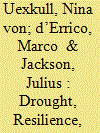

|
|
|
|
|
| Summary/Abstract |
The effects of climate variability and change on security are debated. While this topic has received considerable attention in both policy circles and academia, the microlevel pathways and conditions under which climatic shocks increase conflict risks are poorly understood. We suggest that household resilience provides one key to understanding these relationships. Using novel household survey data from two conflict-affected regions in Eastern Democratic Republic of the Congo, we study variation in the support for violence related to reported exposure to drought and resilience metrics. Using comprehensive multifaceted objective and subjective indicators of resilience, we find that less resilient respondents who report having experienced drought and associated losses are more likely to be supportive of the use of political violence. In contrast, our findings suggest that there is no general association between reporting drought exposure and support for violence.
|
|
|
|
|
|
|
|
|
|
|
|
|
|
|
|
| 5 |
ID:
157096
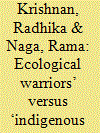

|
|
|
|
|
| Summary/Abstract |
This paper traces the nature of resistance in movements against land acquisition in Jagatsinghpur and Niyamgiri in the state of Odisha in India. At both sites, the movements were united in their opposition to the respective industrial projects, and to the state's notion of ‘development’ premised on resource extraction and large industry. At certain key junctures, the Niyamgiri resistance placed stress on the ‘sacred’ and the spiritual, while the resistance in Jagatsinghpur emphasised ‘traditional’ land- and water-based economic livelihoods. This paper uses these case studies to understand the role of overt and covert ‘performances’ of indigeneity in shaping environmental discourse as well as the state's response to resistance movements.
|
|
|
|
|
|
|
|
|
|
|
|
|
|
|
|
| 6 |
ID:
144258
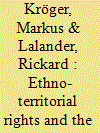

|
|
|
|
|
| Summary/Abstract |
In recent times a growing number of Latin American rural groups have achieved extended ethno-territorial rights, and large territories have been protected by progressive constitutions. These were the outcomes of extended cycles of national and transnational contentious politics and of social movement struggle, including collective South–South cooperation. However, the continent has simultaneously experienced a resource extraction boom. Frequently the extractivism takes place in protected areas and/or Indigenous territories. Consequently economic interests collide with the protection and recognition of constitutional rights. Through a review of selected demonstrative cases across Latin America, this article analyses the (de jure) rights on paper versus the (de facto) rights in practice.
|
|
|
|
|
|
|
|
|
|
|
|
|
|
|
|
| 7 |
ID:
170193
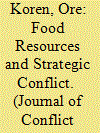

|
|
|
|
|
| Summary/Abstract |
A growing number of studies draw linkages between violent conflict and food scarcities. Yet, evidence suggests that within states, conflict revolves around food resources abundance. I develop an explanation for how the competition over food resources conditions the strategic behaviors of three actors: rebels, civilian producers who grow crops, and state forces. Using a statistical-strategic model, I validate my theory at the subnational level on new high specificity spatial data on staple crop access and productivity in Africa for the years 1998 to 2008 (and use the estimates to forecast conflict on out-of-sample data for 2009 to 2010). In line with theoretical expectations, local variations in food productivity have a positive, statistically significant, and substantive effect on the strategic behaviors of different actors. These findings suggest that the imperative for food denial as a microlevel tactic in civil war should be more seriously incorporated into the work of scholars and policy makers.
|
|
|
|
|
|
|
|
|
|
|
|
|
|
|
|
| 8 |
ID:
112799


|
|
|
|
|
| Publication |
2012.
|
| Summary/Abstract |
This paper examines Indonesia's democratic state capacity-building in terms of transformations in West Timor, particularly around manganese mining. It is structured on the basis of three complementary sets of arguments. Firstly, democratic capacity-building is essentially a power-driven process as it seeks to re-arrange the way in which power is distributed. This process is shaped by the relative capabilities of a variety of societal interests struggling to dominate the control of state power at multiple sites of a highly competitive 'field of power'. Secondly, Indonesia's democratic decentralisation experience has produced uneven results, both between and within provinces. This is largely because the dynamic of the reform process is determined by the relative capabilities of competing social forces to engage in the political landscape and influence revenue generation and resource management policies. Thirdly, manganese mining, which has recently emerged as a quick method of revenue generation in resource-poor West Timor, provides an important case study that reflects the structural dynamics of state (in)capacity.
|
|
|
|
|
|
|
|
|
|
|
|
|
|
|
|
| 9 |
ID:
159862
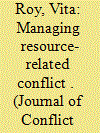

|
|
|
|
|
| Summary/Abstract |
States endowed with valuable lootable natural resources tend to experience longer armed conflicts, more intense fighting in extractive regions and face a higher risk of recurring conflict than states without such resources. At the same time, many states defy resource-fueled conflict traps and set up institutional arrangements that seem to alleviate the risk of recurring conflict. However, policy makers and academics alike lack a sound understanding of the link between postconflict stabilization and strategies of resource management that often escape the paradigm of “good resource governance.” This article contributes to the questions of how to conceptualize diverse institutional arrangements in the resource sector and how to link these emerging institutions to postconflict stabilization. I develop a theoretical framework that predicts the risk of recurring armed conflict based on lootable resource management strategies and conditioning factors. The framework is then tested on a unique event history dataset. Results support the stabilizing effects of inclusive and publicly accountable modes of resource management as advocated for by proponents of “good resource governance.” Alternative resource management strategies either increase the risk of conflict recurrence or interact with other variables, changing the prospects of postconflict stability in important ways
|
|
|
|
|
|
|
|
|
|
|
|
|
|
|
|
| 10 |
ID:
143347
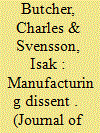

|
|
|
|
|
| Summary/Abstract |
A growing research field examines the conditions under which major nonviolent resistance campaigns—that is, popular nonviolent uprisings for regime or territorial change—are successful. Why these campaigns emerge in the first place is less well understood. We argue that extensive social networks that are economically interdependent with the state make strategic nonviolence more feasible. These networks are larger and more powerful in states whose economies rely upon organized labor. Global quantitative analysis of the onset of violent and nonviolent campaigns from 1960 to 2006 (NAVCO), and major protest events in Africa from 1990 to 2009 (SCAD) shows that the likelihood of nonviolent conflict onset increases with the proportion of manufacturing to gross domestic product. This study points to a link between modernization and social conflict, a link that has been often hypothesized, but, hitherto, unsupported by empirical studies.
|
|
|
|
|
|
|
|
|
|
|
|
|
|
|
|
| 11 |
ID:
192647
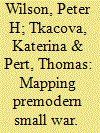

|
|
|
|
|
| Summary/Abstract |
The example of the Thirty Years War (1618–48) demonstrates that small war was already integral to the conduct of premodern hostilities. Commanders employed these methods with a purpose and generally tried to limit the accompanying violence to preserve discipline and effectiveness, as well as their claims to be waging a just war. We explain why conventional histories have neglected the presence of small war in premodernity, and show how its importance, methods, and wider impact can be reconstructed through innovative digital mapping techniques, which have the potential to be applied to conflicts in other times and places.
|
|
|
|
|
|
|
|
|
|
|
|
|
|
|
|
| 12 |
ID:
149472


|
|
|
|
|
| Summary/Abstract |
Why do members of some ethnic groups rebel against the state? One approach holds that groups subject to exclusion from national politics engage in armed conflict. We theorize that the presence of resource wealth moderates the effect of political exclusion. Ethnic groups subject to exclusion whose settlement area includes oil wealth are more likely to experience the onset of armed conflict than groups experiencing exclusion alone. We depart from the convention of cross-national analysis to examine subnational, geocoded units of analysis—ethnic group settlement areas—to better capture the impact of natural resource distribution. Using data on ethnic group political exclusion derived from the Ethnic Power Relations database and geo-coded indicators, we conduct a series of logistic regression analyses for the years 1946 to 2005. We find that exclusion alone increase the likelihood of conflict, while the presence of oil wealth further raises the risk of war.
|
|
|
|
|
|
|
|
|
|
|
|
|
|
|
|
| 13 |
ID:
164165
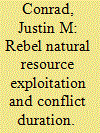

|
|
|
|
|
| Summary/Abstract |
How does natural resource wealth influence the duration of civil conflicts? We theorize that the exploitation of natural resources can strengthen rebels’ “power to resist” the government, but this depends on how rebels earn funding from those resources. Distinguishing between the extortion and smuggling of natural resources, we posit that smuggling in particular is more likely to give rebels the flexibility and mobility needed to effectively resist government repression. We then test this proposition empirically using new data that identify not only whether rebels profit from resources but also how they do so. We find that only when rebels smuggle natural resources do civil conflicts last significantly longer. In contrast, conflicts in which rebel groups earn money from extorting natural resource production are not significantly more likely to endure. This finding is of special interest because past work has largely ignored how rebels earn income from natural resources and the implication this distinction might have on conflict processes.
|
|
|
|
|
|
|
|
|
|
|
|
|
|
|
|
| 14 |
ID:
176077
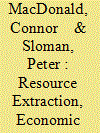

|
|
|
|
|
| Summary/Abstract |
Canada and Australia are two of the economic success stories of the last thirty years, enjoying rapid growth during the 1990s and 2000s and (unlike the UK and US) escaping the worst effects of the 2008 financial crisis. In both countries, however, economic growth has become highly dependent on commodities extraction, leaving them vulnerable to fluctuations in commodity prices, and imposing political constraints on tackling climate change. This article explores the economic and political challenges which the role of the natural resource sector has posed in Australia and Canada in recent years, and examines the contrasting ways in which Scott Morrison and Justin Trudeau’s governments deployed the climate issue in the two countries’ 2019 federal elections.
|
|
|
|
|
|
|
|
|
|
|
|
|
|
|
|
| 15 |
ID:
183148


|
|
|
|
|
| Summary/Abstract |
What is the relationship between natural resources and rebel governance? Previous studies have argued that resource rich groups have fewer incentives to provide social services. We argue, however, that even well-funded rebels may have incentives to provide some social services to civilians. Specifically, rebel groups profiting from the extraction of natural resources should be more likely to offer health care services as a means of ensuring a dependable civilian workforce than groups who do not profit from natural resources. Using data on both the extraction of natural resources and social service provision by rebel groups, we find strong empirical evidence to support our argument. We conclude with implications for scholars and policymakers.
|
|
|
|
|
|
|
|
|
|
|
|
|
|
|
|
| 16 |
ID:
089419
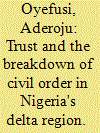

|
|
|
|
|
| Publication |
2009.
|
| Summary/Abstract |
This article examines the concept of trust in the context of resource extraction, focusing on the moral and statutory responsibilities of the state, extractive firms, and host communities, and using Nigeria's Niger Delta as a case study. It attributes ongoing oil-related unrest to the breakdown of trust between these parties. Using a combination of primary and secondary data, it links outbreaks of violence to the failure of the state to foster development, create an enabling environment for economic growth in communities, and build rational institutions for peaceful and sustainable resource extraction; oil companies' exploitation of weaknesses in existing institutional arrangements to promote selfish interests; communities' almost-total dependence on companies for the provision of public goods and employment; and the collapse of trust between communities and between various groups and individuals in the region. To address conflict outbreaks, restore and build trust between parties, it recommends some institutional reforms and policy changes in the oil industry and beyond.
|
|
|
|
|
|
|
|
|
|
|
|
|
|
|
|
|
|
|
|
|